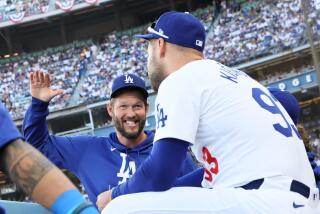Dodgers should sign Clayton Kershaw, long term
- Share via
Prince Fielder was fool’s gold, and Dodgers fans shouldn’t waste one moment of regret that the big lug will spend the next nine years clogging the payroll, the basepaths and eventually the training room for the Detroit Tigers.
The Dodgers’ biggest concern right now is not a Prince, but a king.
What are they going to do with Clayton Kershaw?
The easy answer is, nothing. For the next three years, they don’t have to do anything with the 2011 Cy Young Award winner other than hand him a contract and watch him sign it.
Baseball rules prevent Kershaw from being a free agent until after the 2014 season. Until then, he is sole property of the Dodgers unless they cut him or trade him. He’s stuck in Dodger Stadium, but with one saber he can rattle loudly enough to make things uncomfortable.
That would be salary arbitration.
And, yeah, that can get pretty loud.
As any fan familiar with the incredibly dumb rules of baseball knows, arbitration is a process in which a player with between roughly three and five years of major league experience can have his salary determined by an arbitrator who picks between the player’s demand and the club’s offer. The numbers can get complicated, the arguments can get heated, but the process has two plain truths.
First, most cases are settled before going to arbitration because the hearings can get so ugly. Second, if a case does go all the way, the owners win more than 50% of the time.
Last week, the newly eligible Kershaw submitted an arbitration request of $10 million, while the Dodgers countered at $6.5 million — a huge gap, and a huge problem.
If this case reaches an arbitrator, Kershaw is probably going to lose.
He is asking for a salary higher than any that has ever been awarded to a starting pitcher in his first or second year of arbitration. And he is going against a Dodgers organization that has had some legendary arbitration victories.
Ned Colletti, the Dodgers’ general manager, was part of a Chicago Cubs management team that beat Andre Dawson in arbitration the winter after he won the 1987 most-valuable-player award. Alex Tamin, who is now one of Colletti’s lieutenants, was an outside counsel for the Dodgers when they beat Eric Gagne in arbitration months after he won a 2003 Cy Young Award.
“We obviously try to avoid a hearing, but if we can’t, we do them with class,” Colletti said. “It’s never anything personal, it’s always just about a difference of opinion in value.”
It’s never personal, but it’s always personal. Kershaw wants $10 million, it is the Dodgers’ job to show that he is not worth it, and you tell me how that can’t get personal.
The Dodgers will compare him unfavorably to others, in every number, with every nuance, and by the time it’s done, he will look at them like they were Gerardo Parra.
The Dodgers will win, but they will lose, because even though Kershaw is the toughest 23-year-old kid in baseball, he’s still a kid, and the words will still sting, and who knows what they will mean three years from now when he can actually do something about it?
“You never know how somebody is going to react to it,” Colletti said. “But this kid is level-headed, he’s solid, he understands a lot of things beyond his youth.”
Here’s what I understand: The San Francisco Giants were so reluctant to endure two potential years of arbitration with their star pitcher, Tim Lincecum, that on Tuesday they verbally agreed to give him a two-year deal worth $40.5 million.
Here’s what I also understand: Last summer, in four duels, Kershaw beat Lincecum four times.
Kershaw is not only the Dodgers’ best pitcher, he might be their best citizen, the kind of guy who built an orphanage in Africa and wrote a book about it, the kind of guy who is overpowering on the field and humble in the clubhouse, the Dodgers version of Tim Tebow.
If anybody is worth building upon, it’s this guy. Before the start of the season, Colletti needs to offer him something like a five-year deal that would take him out of the first two years of free agency. It would save the Dodgers long-term money, give Kershaw lifetime security, and remind everyone that the team was back in business. Last summer the Angels’ Jered Weaver signed a five-year extension worth $85 million. How about a deal like that?
It’s sending one message when you pay Matt Kemp $160 million to keep him from skipping town. It’s an entirely different message when you pay Clayton Kershaw nearly $100 million simply to keep him happy. Championship teams know how and when to make both kinds of statements.
Yes, pitchers get hurt. And even though Kershaw has not been injured, he will probably make around 100 starts between now and free agency, which will be like 100 years of strain on the shoulder and elbow.
“It’s precarious because of the youth of the pitcher,” Colletti said of a long-term deal. “In the right situation, we’d be open to it.”
That situation is now. The new television money will pay for it. A new Dodgers culture will demand it. Every argument that anyone made about the Dodgers’ signing Prince Fielder rings far more true with Clayton Kershaw.
The first guy just hits home runs. The second guy is one.
twitter.com/billplaschke
More to Read
Go beyond the scoreboard
Get the latest on L.A.'s teams in the daily Sports Report newsletter.
You may occasionally receive promotional content from the Los Angeles Times.











